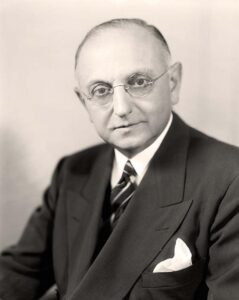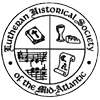 Famous and Forgotten, Frank Buchman should be remembered by Lutherans in the Mid Atlantic for a short-lived spiritual awakening among Protestants around the world. The man himself had what Ernest P Pfatteicher, the president of the Pennsylvania Ministerium, called a ‘roving disposition’ for Buchman could not thrive in a constrained ministry setting but sought always to help individuals, especially those who were down and out, and to do this through cultivating ties with and money from men with social prestige, and to travel far and wide in first class.
Famous and Forgotten, Frank Buchman should be remembered by Lutherans in the Mid Atlantic for a short-lived spiritual awakening among Protestants around the world. The man himself had what Ernest P Pfatteicher, the president of the Pennsylvania Ministerium, called a ‘roving disposition’ for Buchman could not thrive in a constrained ministry setting but sought always to help individuals, especially those who were down and out, and to do this through cultivating ties with and money from men with social prestige, and to travel far and wide in first class.
Educated at Muhlenberg College in Allentown, Pa, Frank Buchman arrived at the seminary in Philadelphia in 1899 and graduated in 1902. There was as regular stream of men from Muhlenberg College who attended Mt Airy seminary, and Buchman enjoyed his time as a seminarian very much as a continuation of friendships formed in Allentown. Highlights from his ministry among Lutherans include his first call to a mission start in Overbrook, and then an immersion in Inner Mission work running a hospice for young men in the city of Philadelphia. The board of the Inner Mission needed more reports from Buchman than he provided, so a new job at the YMCA ministry at Penn State awaited him, but this too was brief. An important visit to a Keswick Convention in England [an evangelical meeting dedicated to promoting the Higher Life] then set Buchman on a new path, and while his ties to Lutherans continued to expand, his anchor in Lutheranism failed to hold him close to the church. Moving beyond the confines of parish and regular reporting, Frank started his own program and organized ‘Group meetings’ that in an informal context challenged individuals to devote themselves to a higher life, and to trust the Holy Spirit to guide them in taking risks and following whatever guidance they felt they received from their daily prayer sessions.
Buchman repeatedly invited Lutherans to attend the group meetings he organized. Some did, others took their time to try them out. Charles Jacobs, professor and then the president of Philadelphia Seminary after 1928 was one target of Buchman’s frequent appeals. He avoided capture. Edward Trail Horn, however, was an enthusiastic participant and helped to organize group meetings among Protestant missionaries in Japan, where he served as a missionary. In 1918 Buchman’s secretary advised him and disclosed Buchman’s method: “It might not be wise to bring in all the evangelists as Mr. Buchman feels that the best and most lasting results are to be had when the groups are small and well selected. He is trying to reach the key men only and large groups are often a hindrance.” Frank Buchman paid for his ‘Bungalow style house’ and Horn named a son after the famous benefactor. Monetary gifts came frequently, as Buchman felt guided to support the missionary’s work. The ‘guidance’ might not be entirely selfless thought some of the Ministerium of Pennsylvania’s leaders, and this caution was published in a short pamphlet written by E.P. Pfatteicher entitled The Man from Oxford. It was distributed free of charge to all the ministers in the ministerium at Christmas, 1934, and based on lectures given at Paradise Falls, a vacation oasis for Lutherans north of Philadelphia.
The group meetings that Buchman ran in cities around the world made him famous. The local religious paper in Allentown, Sweet Charity, published an article about Buchman’s return to the city in May, 1934 and described his methods. “The Buchman meetings were attractive in their extreme simplicity. They are so different from all other forms of Evangelism. There was no shouting, very little singing, praying or public reading of Scripture, but simple, plain, honest testimonies of what the Lord had done for them.” A further note addressed the issue of funding, for evangelistic meetings usually drew attention to these non-spiritual aspects. “No offerings were taken; money is never mentioned. “Who pays the expenses for these meetings?” is a question often asked. We cannot answer these questions, but there are no unpaid hotel bills, etc., etc., reported against the ‘Group” after they left the city.” Allentown was smitten. The secret of these meetings was the intimate, forthright sharing of conviction. “With a delightfully informal yet convincing manner Dr. Buchman pictured every phase of life under the influence of Divine guidance and called “life changing” on a colossal basis the solution to the problems of the world. Canada, he predicted, would be the first country where the influence of the group would be nationwide.” Buchman was wrong about that!
Buchman moved to England, where his movement took the name of the Oxford Group [Not to be confused with the Oxford Movement] because of its headquarters in Oxford, England, Later, the Oxford Group reorganized as the Moral Rearmament Association and this group ties Buchman to the development of Alcoholics Anonymous. Buchman’s papers are now in the Library of Congress because of this chain of associations. To these several constellations of inspirational methods could be added the 1950s enthusiasm for positive thinking. Buchman’s followers among Lutherans in the Mid Atlantic were eager adopters of new and expansive ideas. They were not sticklers for Lutheran polity, nor interested in the development of Lutheran worship or Lutheran theology. These Lutherans joined other Protestants who were instead drawn to personal and world changing spiritual growth, and during the years between the World Wars there were many problems to solve. Buchmanism provided a means to address these ambitions, in small group meetings near home and requiring only a willing spirit and hope-filled action.
Source: Frank Buchman papers, Library of Congress, Box 4, 46, correspondence files.
